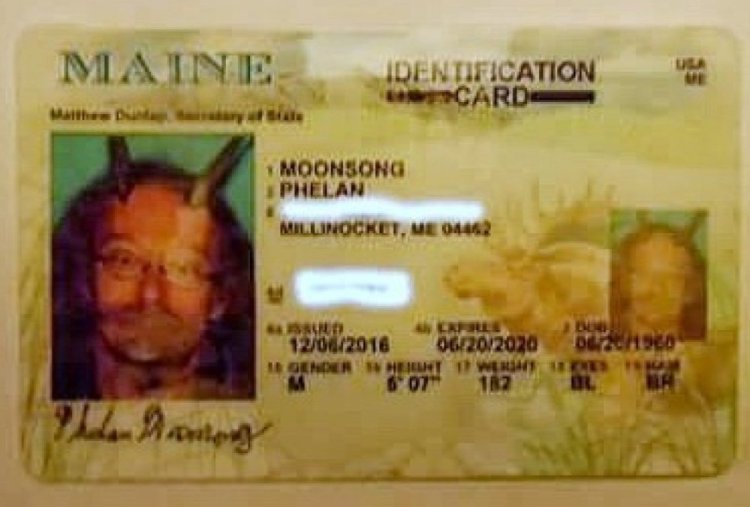It doesn’t matter how many articles of clothing Phelan Moonsong puts on before walking out the door each day: If he’s not wearing his favorite pair of goat horns, the Pagan priest might as well be naked.
Unless the 56-year-old Millinocket, Maine, man is sleeping or bathing, his beloved horns are rarely far from his scalp.
It’s been that way since he first laid eyes on the horns at a Pagan men’s group gathering in 2009. A friend whose goat had recently died offered the horns to group members. Nobody else wanted the dead goat’s hardware; Moonsong couldn’t believe his luck.
So he took the horns home, drilled small holes in each one and attached them to his forehead using stretchy, 50-pound fishing line that he wrapped around his head like an invisible skull cap.
His life was never the same.
“As a practicing Pagan minister and a priest of Pan, I’ve come to feel very attached to the horns, and they’ve become a part of me and part of my spirituality,” Moonsong said.
He noted that he periodically soaks the horns in patchouli and cedar oil to keep them fresh and leathery. “The horns are part of my religious attire.”
Moonsong feels so attached to his horns that he refuses to take them off for anyone – including the state of Maine. In August, Moonsong said, officials at the Bureau of Motor Vehicles in Bangor told him that he would need to remove the horns to receive a state-issued ID.
When he tried to explain to bureau employees that he is a “Priest of Pan” – one who considers the horns his “spiritual antenna” – they were not moved. They told that the horns would have to be approved by Maine’s secretary of state.
“She told me that I had to send in some documentation or religious text to show why it was required for me to have my horns on,” Moonsong said. “I said, ‘OK, I’ll go ahead and do that,’ but it seemed like an onerous requirement.”
Moonsong said he sent the state a personal essay explaining the importance of his horns, along with four scholarly works, including one titled “Pagan Religions: A Handbook for Diversity Training.”
Though he didn’t realize it at the time, Moonsong had joined a religious freedom battle that is being fought in DMV offices around the country.
At least 30 states offer residents high levels of constitutional protection for religious expression, some of them even higher than the protection offered by the Constitution’s First Amendment, according to Charles Haynes, the founding director of the Religious Freedom Center of the Newseum Institute.
“Generally speaking, even in states without a high level of protection, officials have to have a pretty good reason for saying no to a religious accommodation for a driver’s license photo,” Haynes said.
“How strong that reason needs to be depends on where you live.”
But it also depends on the quality of the citizen’s case, Haynes said.
When people argue for the right to cover their faces in a driver’s license photo – such as a Muslim woman who believes it’s immodest to uncover her face – states often have the upper hand because it’s in the interest of the state to assist police in being able to identify people.
“However,” Haynes added, “if the person’s religious garb doesn’t cover the face or obstruct law enforcement, those folks are likely to win.”
Moonsong said he managed to avoid hiring a lawyer and filing a lawsuit.
After several months of waiting to hear from the state’s motor vehicle office following his initial visit, he says he informed the bureau that he was in touch with the ACLU.
His ID arrived in the mail days later, he says.
A spokeswoman for the Maine secretary of state told the Bangor Daily News that Moonsong had not mentioned that the horns were religious in nature during his initial BMV visit.
“He did not cite religious reasons,” said the spokeswoman, Kristen Muszynski. “There are exceptions for religious headdress.”
The newspaper reported that the state of Maine follows American Association of Motor Vehicle Administrators guidelines, which state that license photos “may only show the cardholder with headgear, if the cardholder is a member of a religion requiring the wearing thereof and provided that the headgear does not present as an obstruction or present a shadow and render the portrait inadequate for the identification of the cardholder.”
Moonsong, who changed his name earlier this year, said he was “elated” with the result of his BMV battle – not only for himself but also for others who quietly share some of his beliefs.
“A lot of Pagans are in the closet and – as with the LGBT crowd – there’s a lot of misconceptions and discrimination that they face,” he said.
“Many practicing Pagans are afraid of being public,” Moonsong added, “but when they see my horns it reminds them it’s okay to be yourself.”
Send questions/comments to the editors.


